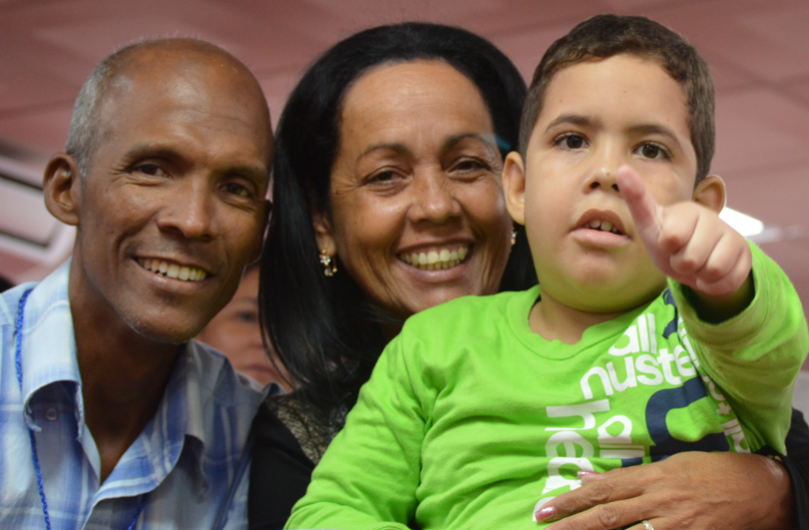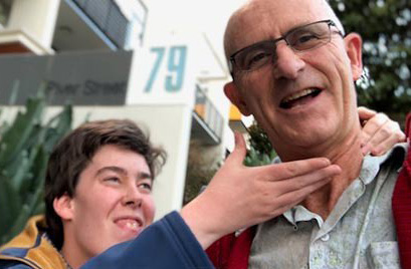Motivating someone with PWS
How many times have you thought “he/she is so lazy….” “they won’t do anything I tell them to do”, “they won’t do their exercise”, “I told him/her to tidy his room 1 hour ago and he/she hasn’t even started”, “ he/she is so slow to get ready”.
Self-motivation is not easy for most people with PWS
A simple way to remember some key tools to help motivate someone with PWS is to think of RED CARRPS. Carp fish constantly swim around looking for food. The colour orange is often associated with “hunger” as it stimulates the brain, increasing mental activity and the sensation of hunger. Red carp are really a deep orange colour.
The R of red is for RESPECT
It goes without saying that every person should be respected for who they are. It is no different for people with PWS. In addition to respecting who they are, if we are to assist them in living a healthy life as a part of society, we must also respect PWS and the commonalities seen in people with PWS. People with PWS think differently, respond differently and react differently to other people. Learning and knowing as much about PWS as is possible, will make life easier for you and your person with PWS.
Learn as much as you can about PWS. Tell your person with PWS that although you don’t have PWS, you do know a lot about it. Tell them you do not know what he/she is expecting but they can help by telling you. Be confident in your knowledge and in telling them know that you understand how hard it must be to constantly want to eat or drink and be distracted by those thoughts.
Understanding how people with PWS think and practising appropriate ways of speaking to them and responding to what they say and do, is important. People with PWS respond and react to the manner in which they are spoken, as well as what is said to them. It can be difficult for them to distinguish between fantasy and reality. As a result of their concrete thinking, poor comprehension and planning, difficulty interpreting the emotions of other people (that is, reading their facial expressions and understanding voice levels) and heightened anxiety they often misinterpret what is meant by other people. Always give them time to comprehend what you say or ask. They will need more time to reply or answer you, than other people. Wait for a response before giving or asking for more information. Some people with PWS feel they are always “in trouble” or being accused of something, so they remain defensive. It is always important to communicate in a way they can understand. Pictures are more easily understood than words. Focus on their strengths and abilities.
C is for Challenge
People with PWS like to achieve. They are often competitive and like to “win” or at least be thought of as very capable. They are capable of many things, but may need to be challenged to demonstrate their capabilities. Suggesting that they can or might be able to … (do something) or do it better than someone else, can often motivate them to take up that challenge. For example “John, I imagine you would be pretty good at swimming. Do you think you can swim across a 15 meter pool? I’d like to give it a go. Do you think you can beat me?” Even setting goals to compete with themselves can be effective: “let’s see if today you can beat your best time of walking around the block…let’s go!”
A is for Acquired Agreement
Encouraging acceptance of what is suggested as positive “self-choice” rather than telling someone with PWS what must be, generally works better. “It is very cold outside. The temperature is xx. Let’s put on a jacket, just in case you need it. What do you think? Would you prefer to wear, the blue or the black one?” Or another example: “If you want to lose more weight, how about having a tub of 3 different types of vegetables – cucumber, tomatoes and carrot, as well as your choice of either a piece of fruit or small tub of low fat yoghurt, for morning tea, instead of 1 small bag of chips? What do you think? This is a lot of food isn’t it?” Remember to always select appropriate choices to offer your person with PWS and allow time for your words to be processed and responded to, once they have been understood.
R is for Responsibility
People with PWS respond well to responsibility. It indicates to them that you believe in their ability. It gives them something to focus on and appeals also to their sense of pride. They are so often “in trouble” so giving them responsibility is a sign to them that you trust them to do something or take charge of something. This can make them feel very good about themselves. What you ask them to take responsibility for needs to be achievable for them. It could be something very simple such as putting the remote controls back where they go each night when the TV is turned off or turning off the light, before sleep. Being responsible for a particular task in a workplace can encourage a well completed job, done with pride. Praising them for the well done job makes them feel successful!
R is for Rewards
We know that most adults with PWS still only have the emotional maturity of small, young children, so rewarding them for things done well, is a form of encouragement to do well again. It also congratulates them for achieving something. However, the reward needs to be appropriate and not something that will prove to be difficult to continue, or threaten their health. It is recommended to never make extra food a reward, but a planned snack or meal that follows an exercise session can be a good motivator. A known reward can be an incentive to complete a task. Rewards for regular achievements should be small/tangible/realistic/repeatable. Never imply that failure to complete a task will result in a loss of a scheduled meal or snack reward; use the reward to motivate by saying “Let’s do this! Then you can relax and have your scheduled snack (or meal).”
Just as with children, effort is motivated by incentives and rewards and with the adult providing the necessary support for the child’s success. So it is for people with PWS, supported incentives and rewards can be used to successfully motivate a person with PWS.
P is for Praise
All people like to receive genuine praise. Recognition for timely completion of a task or not over reacting when the usual physical therapist was not at the gym or coping with an unplanned change to routine are big achievements for people with PWS. These achievements deserve praise, and the praise given will be much appreciated by your person with PWS. Praising positive behaviour as well as achievement nurtures self-esteem and improves mood. They will remember how you reacted and why you praised them. The positive behaviour you praised is more likely to be practiced again!
S is for Security
The more secure a person with PWS feels the lower is their level of anxiety. In order to be able to motivate someone with PWS you must first win their trust, so they can believe in what you say. When you are positive, encouraging and animated you will maintain their focus and interest. Giving them the chance to make a choice, by providing appropriate choices, empowers them in a safe and protective manner. Their sense of security is maintained when you remain calm, gentle, consistent and honest with them. Shouting, coaxing, wheedling or threatening is confusing and may only increase the person’s anxiety levels. Letting them know your realistic boundaries in a quiet, confident voice, also challenges them to act in an acceptable manner. Remember, your happy face and calm voice will increase their comfort and security.
As with all people, mood strongly influences motivation and people with PWS can have rapid and extreme mood changes, most often due to sudden anxiety and misunderstandings. When in some moods, there is very little that can be done to motivate a person with or without PWS, so always wait until a difficult mood passes, to enhance the effectiveness of your motivation.
This article was written by IPWSO’s Famcare Board.
International Community
IPWSO was established so that PWS associations, families, clinicians and caregivers around the world could exchange information and support and have a united global voice under one umbrella.
Information for Medical Professionals
The latest medical and scientific research and information, plus guides into common medical issues affecting people with PWS.



